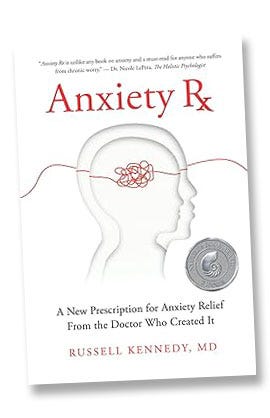Book Freak 137: Finding Relief from Anxiety’s Grip
Four pieces of advice from Dr. Russell Kennedy's "Anxiety Rx"

In his book Anxiety Rx: A New Prescription for Anxiety Relief from the Doctor Who Created It, Russell Kennedy shares his personal journey to heal from chronic anxiety and offers a new perspective on understanding and treating this common condition. Drawing on his medical training coupled with Eastern practices like meditation, Kennedy provides a holistic framework to help readers find relief from anxiety’s grip.
Here are four tips from the book:
Separate the mental and physical components of anxiety
Viewing anxious thoughts and bodily alarm as interconnected makes anxiety very difficult to unravel. By distinguishing worried thinking from alarmed bodily sensations, you can target each component with specific interventions. For the mental aspect of anxiety, practices like meditation, mindfulness, and cognitive behavioral therapy can help you observe anxious thoughts from a distance without engaging or believing them. This diffuses their power over you. For the physical bodily sensations, relaxation techniques like deep breathing, progressive muscle relaxation, yoga, and mindfulness of body sensations can activate the parasympathetic nervous system and calm feelings of alarm.
Bring awareness to anxious thoughts without getting caught up in them
Notice worried thoughts arising without following or arguing with them. This helps diffuse their power. Starve anxious thoughts of the credibility, belief, and attention they need to persist. Use mindfulness to observe thoughts non-judgmentally without believing or engaging with them. This prevents you from getting sucked into the storyline of the anxious thinking. Practice attention redirection by intentionally focusing on something else when you notice anxious thoughts arising. Shift your concentration to physical sensations, breathing, or external sights/sounds. Reframe worrying as wasted energy and make an empowered choice to focus your mental energy on the present moment. Repeatedly bring your concentration back to the body and out of the head which houses anxious thoughts.
Use mindfulness and breathing to calm the body
Slow, deep breathing activates the parasympathetic nervous system, lowering feelings of alarm. Keeping attention on the physical sensations of inhaling and exhaling helps ground you in the present moment.
Don’t try to forcibly resist anxiety
Trying to suppress anxiety often backfires and strengthens its grip. Instead, adopt an allowing, non-judgmental attitude toward your anxious experiences. Remind yourself that anxiety is temporary and cannot truly harm you. Avoid value judgements about whether it is good or bad – simply let it be. This helps discharge the fight-or-flight pressure behind anxiety. Resisting it often paradoxically reinforces it, while allowing space for it to unfold results in it gradually dissipating on its own.
09/20/23





